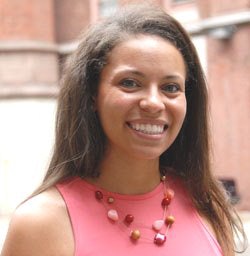 Amanda Washington
Amanda WashingtonSystemic and systematic inequity within our nation’s education system necessitated the creation of historically Black colleges and universities (HBCUs). An HBCU is defined under the 1965 Higher Education Act as “a college or university that was established prior to 1964, whose principal mission was, and is, the education of black Americans.” In an era in which Black people have to remind the world that our very lives matter, it should come as little surprise that we are also pressured to prove that HBCUs, created to empower and educate us, also matter.
This week I had the opportunity to attend The Return on Investment Convening, an assembling of university presidents, graduates, professors and those passionate about the success of minority-serving institutions (MSIs), hosted by The Penn Center for Minority Serving Institutions and Educational Testing Service (ETS). Throughout the two-day conference, empirical data and personal testimonies spoke to the power of HBCUs and other MSIs, such as tribal colleges and universities, Hispanic-serving institutions, and Asian American and Pacific Islander-serving institutions. There is evidence that HBCUs and other MSIs consistently produce impactful and productive national and global leaders.
In an address to the attendees, Dr. David Wilson, a two-time graduate of Tuskegee University and the current president of Morgan State University, reflected on his life, primary schooling, hindrances as the son of an illiterate Alabama sharecropper and the transformational experience of attending one of America’s premier HBCUs. “I wasn’t supposed to be here,” was his humble response to his decorated introduction — which boasts two graduate degrees from Harvard University, chancellorship of the University of Wisconsin, vice presidency of Auburn University, an associate provost appointment at Rutgers, the State University of New Jersey, and a U.S. presidential appointment.
His is a single example among the thousands of successful graduates produced by the nation’s HBCUs. A countless number of successful HBCU alum could respond in the same fashion as President Wilson. While the current 105 HBCUs account for 3 percent of American colleges and universities, in 2013, HBCUs produced 22 percent of Black college graduates and housed 96 percent of all tenured Black faculty. In addition, according to The Network Journal, among African-Americans, HBCUs have produced 40 percent of the members of Congress, 12.5 percent of the nation’s CEOs, 40 percent of engineers, 50 percent of non-HBCU professors, 50 percent of lawyers and 80 percent of judges. Like President Wilson, many of these graduates have and continue to rise above unjust barriers to reach success.
Despite the remarkable contributions of their graduates, HBCUs find themselves frequently thwarting attacks and budget cuts, forcing them to defend their value to postsecondary education, the nation and the larger global economy. As Black people continue to be marginalized and made to feel less than in greater society, the question of HBCU relevancy tacitly challenges and ignores evidence of the success of HBCUs’ educational models.
The chief value of HBCUs is in their ability to create success stories and convince historically a disenfranchised people that they are, in fact, “supposed to be here.” Many Blacks in America believe that they are not valued and are unwelcomed in a society that has yet to remedy its historical reliance on prejudice and privilege. Despite legal victories combating systematic injustices, there remain inequalities within our nation’s education system. HBCUs, remaining true to their mission, continue to educate and empower a people who, without such safe spaces and supports, might forget they, too, are America.
A recent Gallup Poll discovered that Black graduates of HBCUs possess a stronger sense of identity and purpose in comparison to their Black counterparts having graduated from predominantly White institutions (PWIs). This is one of many qualitative indicators of the positive impact of the HBCU educational model. Stakeholders in the higher education community must understand and appreciate the critical role played by HBCUs. As the demographics of our country consistently change and more students of color are enrolling in postsecondary institutions, attention must be given to the inputs and activities of HBCUs that yield successful outcomes and produce productive people.
Many institutions are fast learning that acts of racism and the degradation of people of color will no longer be tolerated or ignored. Rather than questioning why HBCUs are relevant, it is time for PWIs to ask HBCUs what they can do to better support and nurture the success of students of color on their campuses.
Amanda Washington is a Ph.D. student at the University of Pennsylvania’s Graduate School of Education and a research assistant for the Center for Minority Serving Institutions. She has earned an M.A. in education policy and social analysis from Teachers College, Columbia University, an M.A.T. from American University, and a B.A. from Spelman College. She completed graduate internships with the White House Initiative on Educational Excellence for African Americans and the White House Initiative for Historically Black Colleges and Universities.





















